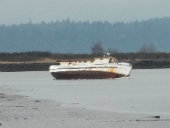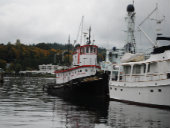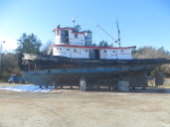For Vessels 35 feet or Longer and 40 Years or Older



Increasingly, over the past decades, the public has picked up multi-million dollar tabs to lift and dispose of older, larger vessels that have sunk and contaminated the public’s state-owned aquatic lands of Washington. Example photos, above, help tell the story. At left is the aptly named uninsured Cape Caution, which was run aground by its owner while in transit to a buyer, and cost the state (DNR) $77,500 to remove and dispose of. The Chickamauga, pictured in the other 2 photos, uninsured and unmaintained, sank at moorage. The US Coast Guard paid to raise and cleanup the contamination — at an unknown cost — while DNR spent $52,000 to tow and dispose of the vessel.
To address the problem earlier in the life cycle of vessels, when they are less expensive to deal with, new legal requirements went into effect in June and July of 2014.
These requirements are designed to encourage vessel-owner responsibility, and reduce the potential financial impacts to the public from large derelict and abandoned vessels that end up in public waterways.
Marine Insurance Requirements
Effective June 12, 2014 the Legislature revised RCW 79.100 to require that:
- At the time of title transfer buyers/transferees of these vessels need to secure at least $300,000 in marine insurance coverage encompassing general, legal, and pollution liability protection. The insurance policy must have a term of at least twelve (12) months following the buyer’s/transferee’s assumption of vessel ownership. Buyers/transferees may obtain multiple insurance policies to ensure they have the minimum coverage.
- Buyers/transferees need to provide proof of the insurance policy to:
- The seller/ transferor of the vessel upon purchase or other transfer; and
- The Washington State Departments of Licensing upon registration or Revenue upon the payment of any taxes, if applicable.
- SELLERS OF VESSELS more than 35 feet in length and more than 40 years old are to provide the buyers with marine survey inspection information before transferring the title, and they need to see proof that the buyers have secured marine insurance coverage.
- BUYERS OF THESE VESSELS are to secure marine insurance and provide proof of coverage to the seller, and either the Department of Licensing upon registration, or the Department of Revenue upon paying any taxes, if applicable.
- This marine insurance requirement only applies to new owners/transferees at the time of title transfer, not to existing owners who acquired the vessel before June 12, 2014.
More detail about Vessel Inspection Requirements
Effective July 1, 2014 the Legislature revised RCW 79.100.150 to require that:
- The sellers/transferors of these vessels need to provide the buyers/transferees with a vessel inspection disclosure report before transferring title. The report can be prepared for either the seller/transferor, lien holder, buyer/transferee, vessel broker, or associated financial and insurance providers for the vessel.
- U.S. Coast Guard Certificates of Inspection are acceptable forms of vessel condition determination.
- WAC 332-08-101 to -124 spells out the minimum vessel inspection requirements. The vessel inspection must be completed by a professional marine surveyor who is a third party to the transaction. The inspection must be completed within thirty (30) days prior to transfer of ownership.
- The sellers/transferors need to send a signed Acknowledgement Form and accompanying copy of the report or U.S. Coast Guard Certificate of Inspection to the Washington State Department of Natural Resources. By providing this documentation, the sellers/transferors will avoid potential secondary liability for the vessel if it becomes abandoned in the future.
Consequences of increased financial liability for non compliance
- A BUYER who fails to secure and maintain the minimum marine insurance coverage is guilty of a misdemeanor. Most importantly, they will incur liability for the vessel if it becomes derelict or abandoned. In addition, their moorage facility may cancel their moorage agreement for noncompliance.
- The State Department of Natural Resources (DNR) may contact any vessel owner required to have an insurance policy to ensure compliance with this legal requirement.
- A SELLER who chooses to finalize a sale or transfer with a buyer who has not provided proof of a marine insurance policy, assumes secondary liability for the vessel (consistent with RCW 79.100.060) if the vessel is later abandoned by the buyer/transferee or becomes derelict prior to a later ownership sale/transfer.

